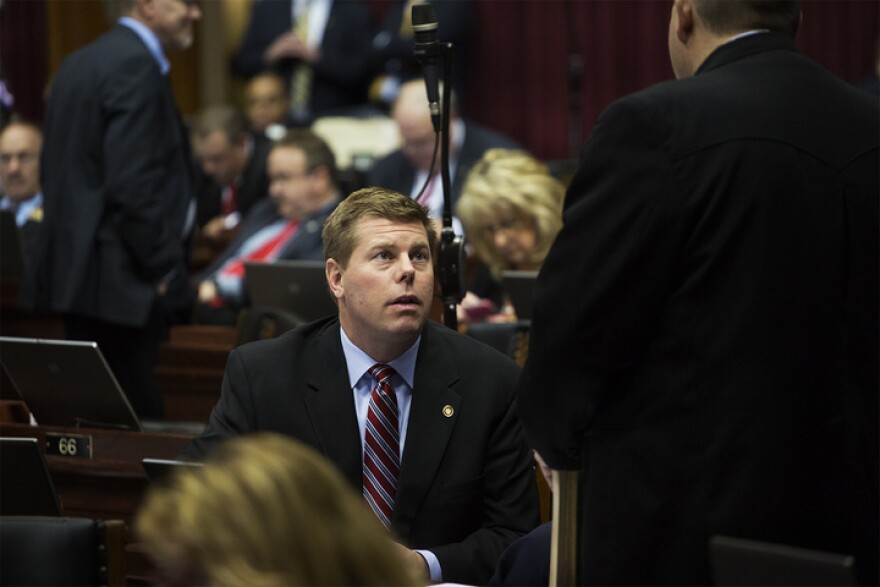Mike Meinkoth vividly remembers how term limits were sold to Missourians in 1992: By limiting lawmakers to eight years in the House and eight years in the Senate, proponents contended the General Assembly would become more responsive — and consistently get new members with fresh ideas.
More than 25 years after voters approved the constitutional amendment, Meinkoth wanted to know if those promises were kept. He asked Curious Louis: “It's been 25 years since term limits went into effect for state legislators. Has there been a study to determine the effect of these limits?”
“Let’s look at the data that’s been collected over 25 years and look back and run the data to see ‘Did this approach address that purpose?’” said Meinkoth, a Jefferson City resident who is a state employee.
The short answer: Yes. In 2013, David Valentine with the University of Missouri's Institute of Public Policy concluded term limits did little to increase gender diversity in the legislature, and often attracted younger people to run for seats as they became open.
But lawmakers from both parties say the impact of term limits goes beyond data or numbers, making it harder for politicians to get along with each other, which in turn affects whether bills pass or fail.
Bad blood

Missouri is one of 15 states with term limits. Most of its neighbors, like Illinois and Kansas, allow senators and representatives to serve as long as voters will keep them.
With the limits, nearly every current member of the Missouri House and Senate started their legislative service after 2002 — a big change from when lawmakers hung around for decades.
Tracy McCreery doesn’t believe that’s a good thing. The Olivette Democrat worked for former Gov. Bob Holden and as a staffer to former Democratic state Sen. Joan Bray before winning election to the Missouri House.
McCreery, who has spent about four sessions in the House, said term limits give lobbyists more power because they’ve often been around longer than representatives or senators and know more about the issues.
Term limits make it harder for lawmakers forge close relationships, too, she said.
“When you start a new job anywhere, you’re motivated to get to know people that you work with. Because you’re like ‘this is a great company, I want to work here for a while. I want to be happy at work.’ And you’re motivated to find out about family and what their hobbies are and things like that,” McCreery said. “With term limits, there’s absolutely no motivation to get to know people.”
A less social legislature may not seem like that big of a deal. But many lawmakers, including Senate President Pro Tem Ron Richard, R-Joplin, said term-limited senators were more inclined to filibuster bills, especially because they didn’t have to go before voters again.
Richard, who was first elected to the Missouri House in 2002 and won an open Senate seat in 2010, said personality clashes affect the flow of legislation.
“I think that’s why I’m a little bit jaundiced about term limits,” the Joplin Republican said. “You can’t make a deal with somebody, because everybody knows you’re going to be gone, so people don’t need to keep their word.”
Others see an upside to what Richard was describing.
Because he’s barred from running for the legislature after 2018, St. Joseph Republican Sen. Rob Schaaf said he has more freedom to oppose some of his party’s leadership. He also hasn’t taken a political donation in years, which he says reduces the amount of political influence on his decision-making.
Changing term limits

Richard and McCreery’s complaints are not new. But efforts to significantly change how term limits work haven’t gone very far, with the exception of allowing lawmakers elected in special elections to serve longer terms.
This year, lawmakers didn’t pass Rep. Dean Plocher’s proposal that would increase from eight to 12 years the maximum amount of time someone could spend in a legislative body. After they’ve hit the 12-year mark in the House or Senate, that person could serve four more years in the other chamber.
The Des Peres Republican still believes term limits are a good thing, but said lawmakers may gain expertise if they’re allowed to serve in the House or Senate for longer periods of time.
“Now I don’t know what percent might serve 12 years, certainly not everybody,” Plocher said. “But what we have now, there are accusations that lobbyists have a greater influence with term limits. And this, if that were true, would help cut back on that.”
As former Lt. Gov. Peter Kinder pointed out last year, voters would have to approve any change to the current system, and that could be a tough climb.
“The people grafted this onto constitution by a … supermajority, and it’s not going anywhere,” said Kinder, who served 12 years in the Missouri Senate and 12 years as lieutenant governor. “I understand the arguments against term limits, but I’ve seen it move some awfully capable people into public office that might not have ever had a chance.”
There’s more turnover to come: More than 25 percent of the members in the Missouri House and the Missouri Senate will depart in 2018 due to term limits.
Follow Jason on Twitter: @jrosenbaum






